The results reveal Americans also confuse heart attack & stroke symptoms, compromising proper response
Cleveland Clinic News Service | 216.444.0141
We’re available to shoot custom interviews & b-roll for media outlets upon request.
CCNS health and medical content is consumer-friendly, professional broadcast quality (available in HD), and available to media outlets each day.

When it comes to heart health emergencies, many Americans don’t have the knowledge to aid others, and often don’t know the proper way to help themselves, according to a new Cleveland Clinic survey.
The survey found that slightly more than half of Americans (54 percent) say they know how to perform CPR; however, only one in six know that the recommended technique for bystander CPR consists of just chest compressions – and no breaths – on an adult. Even fewer, 11 percent, know the correct pace for performing these compressions (100 to 120 beats per minute).
(Watch the survey result video below)
News: Cleveland Clinic survey finds only half of Americans say they know CPR. Full results ➡️ https://t.co/zImkl1HsHr #LoveYourHeart ❤️ pic.twitter.com/HSRb78n89X
— Cleveland Clinic (@ClevelandClinic) February 1, 2018
In the event of a cardiac arrest, an automated external defibrillator (AED) can also be a lifesaver. However, only about a quarter (27 percent) of Americans say there is an AED at their workplaces.
“When someone is suffering from cardiac arrest, time is not on their side,” said Steve Nissen, M.D., chairman of Cardiovascular Medicine at Cleveland Clinic. “Immediate CPR can be the difference between life and death, doubling or even tripling a person’s chance of survival. It’s a skill that can be easily learned, and we encourage everyone to equip themselves with this knowledge and not be afraid to use it during an emergency.”
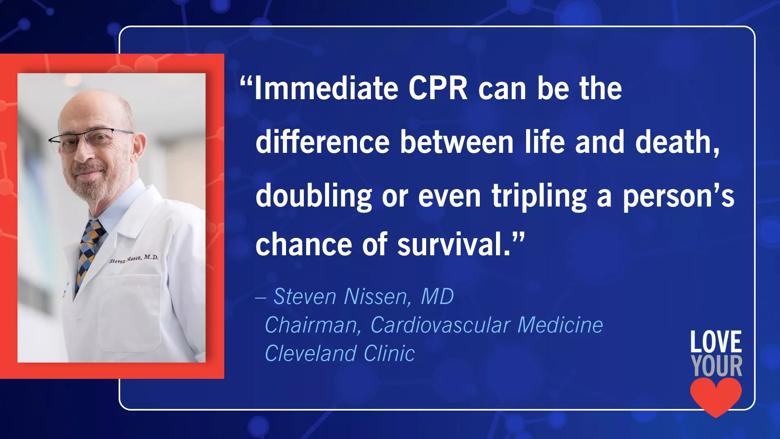
Image content: This image is available to view online.
View image online (https://assets.clevelandclinic.org/transform/bf4a40e0-fcda-4b69-a0aa-9799fc0be903/Nissen-quote-heart-month-1242018_jpg)
For 23 years in a row, Cleveland Clinic Heart and Vascular Institute has been ranked number 1 by U.S. News & World Report.
When it comes to their own heart emergencies, Americans need additional education in identifying and responding to a heart attack. The survey found that many Americans confused stroke and heart attack symptoms. Fifty-nine percent falsely identified sudden numbness or weakness of the face, arm or leg as a symptom of a heart attack, and 39 percent thought slurred speech was a heart attack symptom. Most Americans knew that pressure/squeezing in the chest, shortness of breath and pain in one or both arms were typical symptoms, but less than half of Americans knew back or jaw pain and nausea/vomiting can be heart attack indicators.
“Every year about 735,000 Americans experience a heart attack. It’s vital to know the correct signs and symptoms, so people can take the best first steps to help themselves during an emergency. Knowing how to properly respond to a heart attack could save your life or the life of a loved one,” said Dr. Nissen.
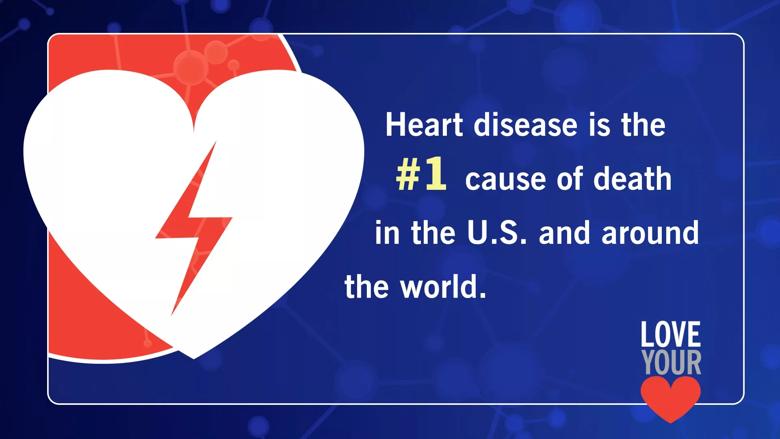
Image content: This image is available to view online.
View image online (https://assets.clevelandclinic.org/transform/09ba8f44-7d48-4abc-8ab4-2d85b90a22f4/death-heart-month-124201heat8_jpg)
For 23 years in a row, Cleveland Clinic Heart and Vascular Institute has been ranked number 1 by U.S. News & World Report.
While most Americans know to call 911 as the first step in responding to a heart attack, only about one-third (36 percent) know that they should chew an aspirin right away. Even so, about one in ten Americans thinks the first thing they should do when experiencing a heart attack is to call their physician or drive to the hospital. There is also confusion as to what a heart attack actually is, as 87 percent falsely believe cardiac arrest is another term for heart attack. Cardiac arrest is the sudden stopping of the heart, usually caused by the malfunction of the heart’s electrical system, while heart attacks occur when a coronary artery becomes blocked, stopping the flow of blood to the heart muscle and damaging it.
Heart disease is the No. 1 cause of death in the United States and around the world. The survey was conducted as part of Cleveland Clinic’s “Love your Heart” consumer education campaign in celebration of American Heart Month. Cleveland Clinic has been ranked the No. 1 hospital in the country for cardiology and cardiac surgery for 23 years in a row by US News & World Report.
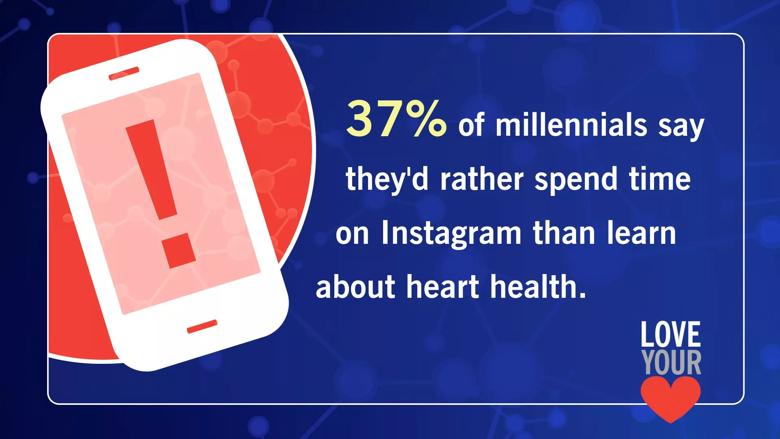
Image content: This image is available to view online.
View image online (https://assets.clevelandclinic.org/transform/d147d053-831a-42a5-ae42-d3c22eb7660a/illenials-heart-month-1242018_jpg)
For 23 years in a row, Cleveland Clinic Heart and Vascular Institute has been ranked number 1 by U.S. News & World Report.
Additional survey findings include:
Methodology
Cleveland Clinic’s survey of the general population gathered insights into Americans’ perceptions of heart disease and exercise. This was a online survey conducted among a national probability dual-sample consisting of 1,007 adults, 470 men and 537 women 18 years of age and older, living in the continental United States. We have weighted the numbers to be nationally representative. This online survey was conducted by Research Now between October 8 and 23, 2017. The margin of error at a 95% confidence level is +/- 3.1 percent.
Related patient stories:
Related heart health stories from our Health Essentials blog:
Experts available:
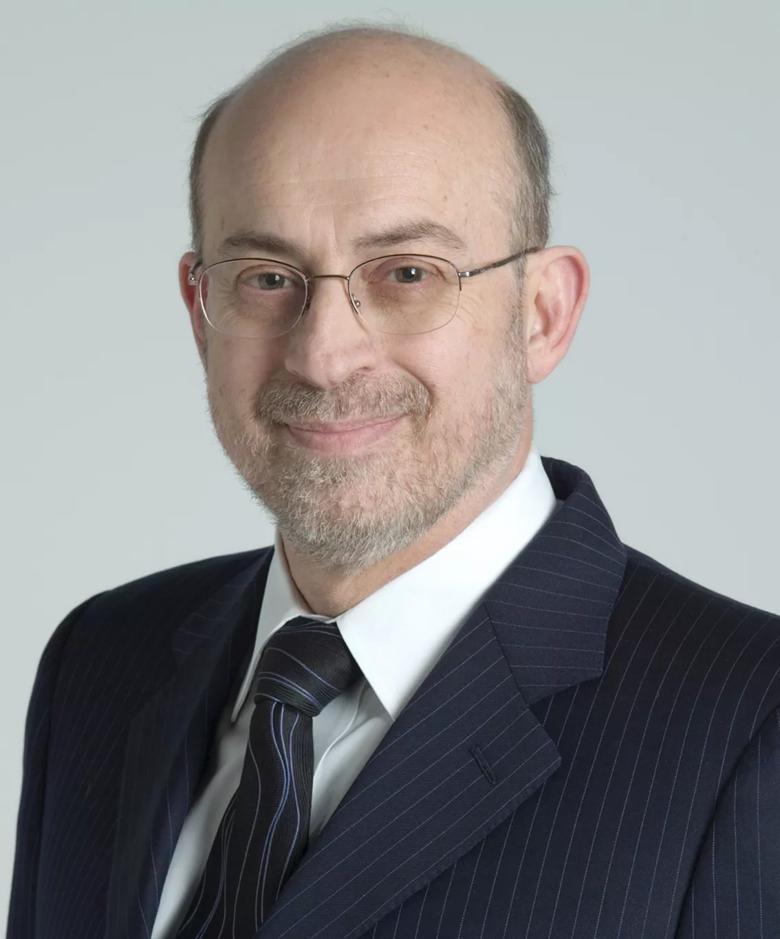
Image content: This image is available to view online.
View image online (https://assets.clevelandclinic.org/transform/144827b3-8136-45ee-ac9f-1be53406180f/Nissen_crop_jpg)
Steven Nissen, M.D., M.A.C.C. , Chair, Cardiovascular Medicine
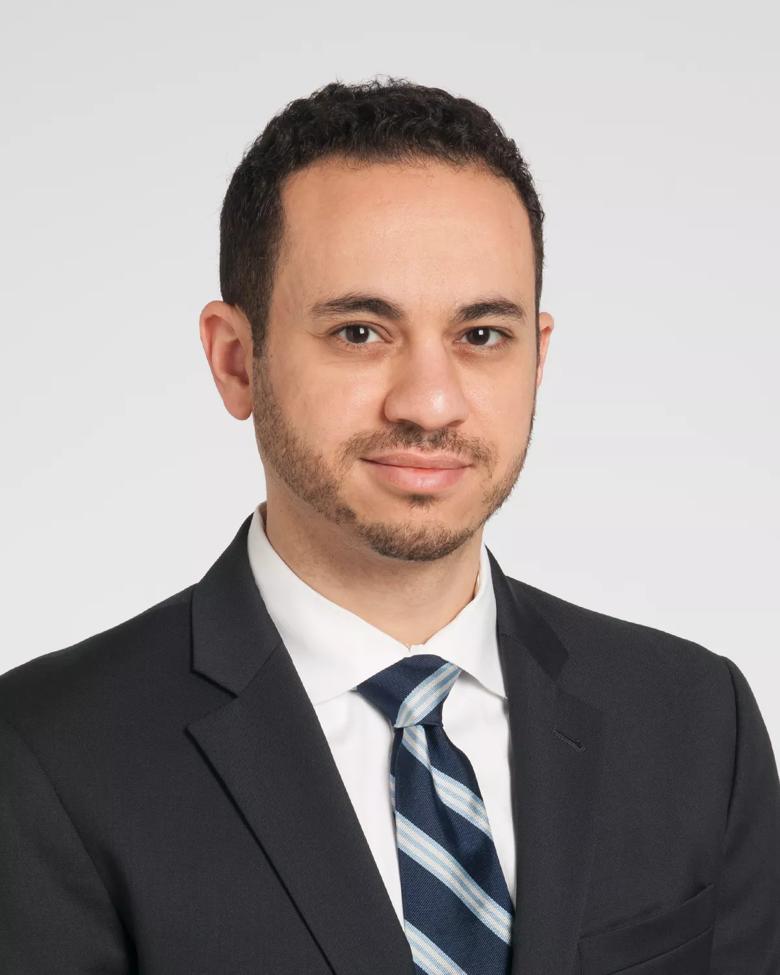
Image content: This image is available to view online.
View image online (https://assets.clevelandclinic.org/transform/e9e9ca54-d87b-4f68-8f37-d76d3b77569e/Ahmed_Haitham_650725_jpg)
Ahmed, Haitham, M.D., Cardiovascular Medicine
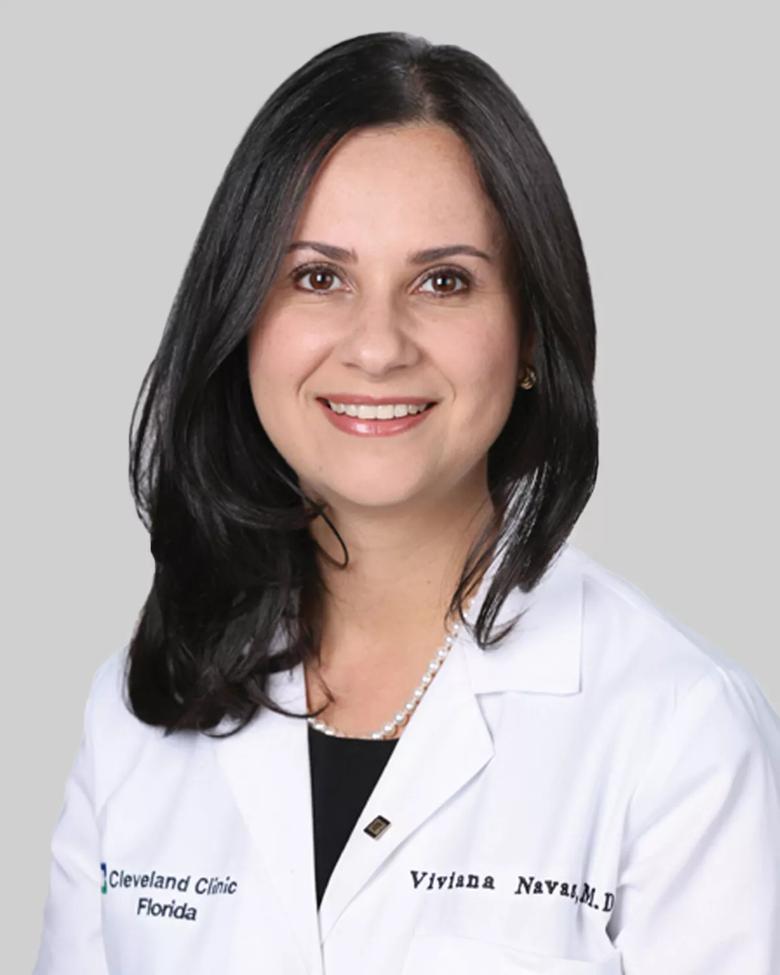
Image content: This image is available to view online.
View image online (https://assets.clevelandclinic.org/transform/f23243e3-0e7d-4e49-8e4a-b30ebcb480a8/Navas_Viviana_jpg)
Viviana Navas, MD, Cardiovascular Medicine
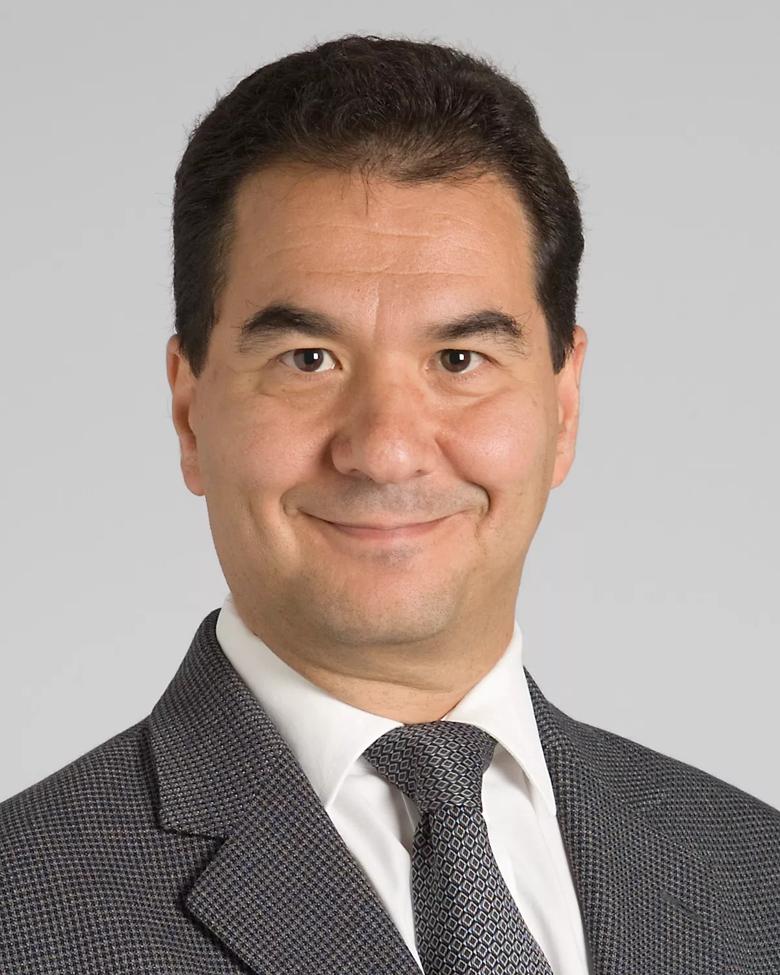
Image content: This image is available to view online.
View image online (https://assets.clevelandclinic.org/transform/3eb842c5-60f9-483a-87c4-3f6bdb33ba26/Rodriguez_-L-Leonardo_422319_jpg)
Leonardo Rodriguez, M.D., Cardiologist

Image content: This image is available to view online.
View image online (https://assets.clevelandclinic.org/transform/5818ab7d-a628-4769-b531-454b0d000b39/Joyce_Emer_894038_jpg)
Emer Joyce, MD PhD, Cardiovascular Medicine
Info graphics available for download:

Image content: This image is available to view online.
View image online (https://assets.clevelandclinic.org/transform/bf4a40e0-fcda-4b69-a0aa-9799fc0be903/Nissen-quote-heart-month-1242018_jpg)
“Immediate CPR can be the different between life and death.”

Image content: This image is available to view online.
View image online (https://assets.clevelandclinic.org/transform/d147d053-831a-42a5-ae42-d3c22eb7660a/illenials-heart-month-1242018_jpg)
37 % of millennials say they’d rather spend time on Instagram than learn about heart health.
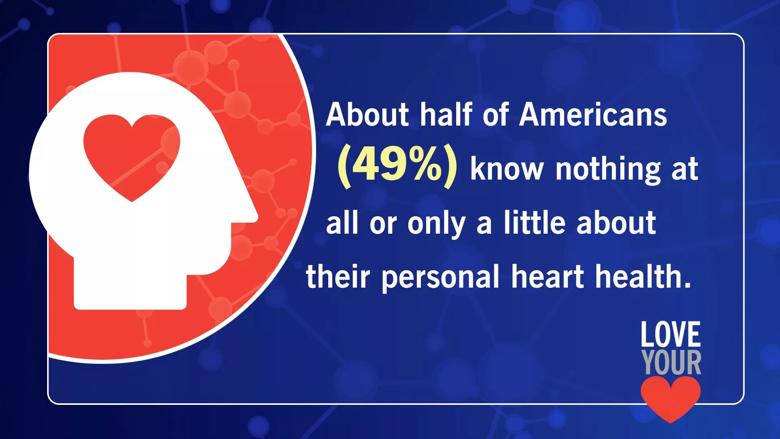
Image content: This image is available to view online.
View image online (https://assets.clevelandclinic.org/transform/75677fce-9f8f-4491-96a0-330458ae408f/ealth-heart-month-124201heat8_jpg)
About half of Americans know nothing at all about their personal heart health.

Image content: This image is available to view online.
View image online (https://assets.clevelandclinic.org/transform/09ba8f44-7d48-4abc-8ab4-2d85b90a22f4/death-heart-month-124201heat8_jpg)
Heart disease is the number 1 cause of death in the U.S.
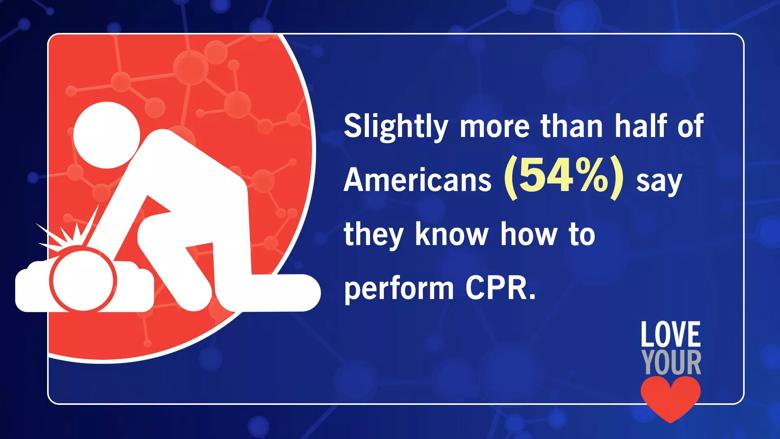
Image content: This image is available to view online.
View image online (https://assets.clevelandclinic.org/transform/5abf4d4e-7f62-446f-b645-31061f477cf0/cpr-heart-month-124201heat8_jpg)
Slightly more than half of Americans say they know how to perform CPR.
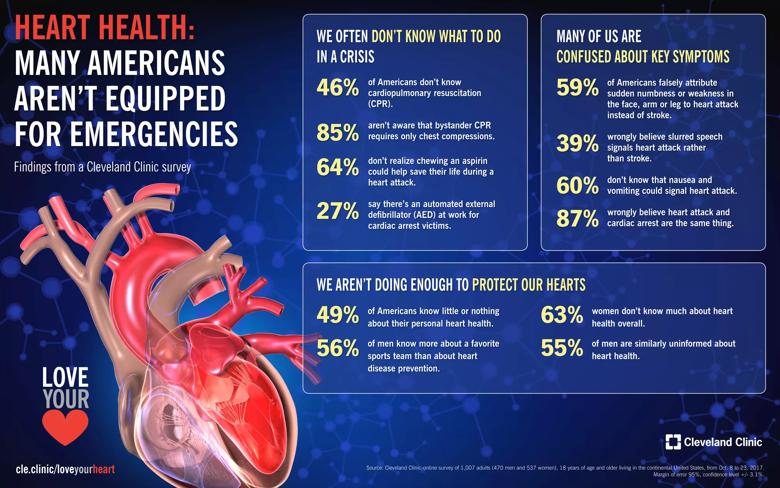
Image content: This image is available to view online.
View image online (https://assets.clevelandclinic.org/transform/9e2187c1-13c0-4007-b09c-1a6007b4fda3/Love-Your-Heart-Infographic_jpg)
Love Your Heart Survey Results
Video available for download:
For Media: Are you interested in repurposing this story for your platforms? Go for it! We want to share compelling Cleveland Clinic news with as many people as possible. Feel free to use our reporting, photos and graphics. Cleveland Clinic News Service can provide additional video assets.
Please link back to this article and tag @ClevelandClinic on social when you publish your story.